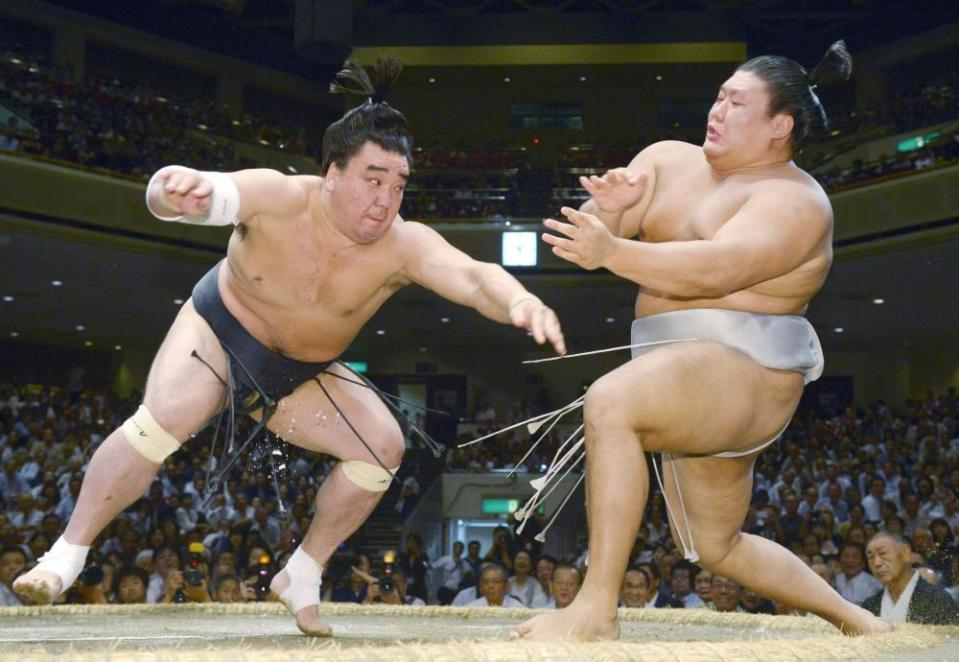Sumo wrestling embroiled in scandal again after champion admits assault

Japan’s ancient sport of sumo is again fighting to salvage its reputation after a top-ranking wrestler seriously injured a fellow competitor in an alcohol-fuelled attack.
Harumafuji, one of four reigning grand champions, or yokozuna, has admitted assaulting Takanoiwa, a more junior wrestler, at a party last month, in the latest scandal to hit Japan’s national sport.
Police have launched an investigation into the Mongolian following a complaint from his 27-year-old alleged victim. Speculation is mounting that Harumafuji will be forced to resign in disgrace.
Media reports said the 33-year-old had been drinking with several other Mongolian wrestlers during a regional tour in western Japan when he allegedly struck Takanoiwa over the head with a beer bottle as punishment for his “poor attitude”.
When Takanoiwa then attempted to answer his mobile phone while Harumafuji was berating him, the yokozuna punched him as many as 30 times, leaving him with concussion, a fracture to the base of the skull and other injuries, according to Kyodo news.
He spent five days in hospital and was unable to compete in a tournament in Fukuoka, south-western Japan, which began on Sunday. Harumafuji, who was bidding for his 10th title, withdrew on the third day after the assault became public.

“I apologise deeply for causing trouble to his stable master, his stable, the Japan Sumo Association and my stable master,” he told reporters.
The assault by Harumafuji, who as a yokozuna is expected to display exemplary behaviour at all times, has dominated TV talkshows and received widespread media coverage.
The incident comes just as sumo was beginning to rebuild its reputation following a string of scandals and criticism that the sport’s authorities had failed to address a culture of violence outside the ring.
In 2007, Takashi Saito, a 17-year-old trainee who fought under the name Tokitaizan, died after he was tortured and beaten by his stable master and three senior wrestlers for attempting to leave his stable without permission. His stable master was sentenced to six years in prison.
Violence aside, in recent years sumo has been rocked by match-fixing and illegal betting. In 2010, two wrestlers tested positive for marijuana use, heaping more embarrassment on a sport whose exponents pride themselves on their gruelling training regime and supposedly disciplined lifestyle.
Japanese media said the incident had once again cast a shadow over sumo. Condemnation of Harumafuji has given way to “disappointment that sumo’s veiled underbelly has yet again stained the reputation of Japan’s national sport”, the Kyodo news agency said.
Sumo had started to capture the public’s imagination after years of falling interest, with no fewer than four yokozuna – three of whom are Mongolian – vying for supremacy and venues selling out for the six major tournaments of the year.
In January, Japanese sumo fans celebrated when Kisenosato became the first homegrown wrestler to attain the rank of yokozuna in almost two decades.
Harumafuji is not the first yokozuna whose questionable temperament could bring a premature end to his career. In 2010, the Mongolian wrestler Asashoryu retired, weeks after he allegedly broke a man’s nose in an assault outside a Tokyo nightclub.
The Japan Sumo Association has come under fire for failing to take immediate action against Harumafuji. Masayuki Tamaki, a sports commentator, said sumo had yet to join other sports in rooting out bullying and violence. “There is a strong tendency toward violence,” he told the Asahi Shimbun.
Japan’s top government spokesman, Yoshihide Suga, told reporters that the public “expects wrestlers to understand the weight of tradition they carry outside of the ring, and to devote themselves to their training”.
Harumafuji, whose real name is Davaanyam Byambadorj, made his professional debut in 2001 and has won nine titles. The 137kg (300lb) wrestler was promoted to yokozuna in 2012, becoming the third consecutive Mongolian-born athlete to reach sumo’s highest rank.

 Yahoo News
Yahoo News 
